A changing world needs changing skills. Discover how you can retool your employee education program to thrive in 2021 and beyond.
Like most agencies, you likely have an employee education program as well.
But has this program kept pace with the new normal of the post-pandemic world?
Most agency employee education programs focus on upskilling. However, as more and more agencies move partially (and even completely) remote, your employees have entirely new challenges to contend with: collaborating remotely, staying productive, and managing their mental health.
If you want your people - and your agency - to thrive, you have to rethink your approach to employee education. Upskilling is not enough; you have to shift your learning strategy for an entirely new way of working.
I’ll discuss this new education strategy in more detail below. You’ll learn:
- How to map the future of your business
- How to identify your current skill gaps
- How to help employees manage the transition to remote work/learning
Why the Current Employee Education Model Doesn’t Work
What does your current employee education approach look like? In-person workshops? Annual conferences? Online courses with supplementary in-person training?
As we watched conference after conference get canceled this year, it’s clear that in-person learning is not going to be viable - at least for the near future. Online education, which has filled so much of the learning gap, is going to be hard to displace, even once the pandemic ends.
Three reasons why:
- Cost: Annual conference tickets can cost hundreds, even thousands of dollars. In-person weekend workshops are the same. In contrast, online courses and conferences are a fraction of the price.
- Convenience: It’s hard to understate the convenience of getting a top-tier education without traveling or coming to work on the weekend.
- Flexibility: In-person courses and workshops tend to have a more rigid curriculum and schedule. You can’t swap instructors or retool the learning material easily because of the in-person component. With online learning, however, creating and updating the curriculum is as easy as uploading a new video or swapping one webinar host for another.
The final point - flexibility - is particularly important. As a lot of agencies are starting to find out, established courses and conferences are not equipped for the post-pandemic, remote-first world.
A learning mode that is more flexible ensures that the curriculum can stay abreast of our rapidly changing times.
You also have to factor in that for a lot of you, your business model might change completely in the next year or so. If you were a small shop that mostly served local businesses, you could go global as you embrace remote work.
The skills required by your clients is changing as well. E-commerce and digital was already the future, but now, it seems that the future will be here much sooner. If your employees don’t have the right skills for this digital-first future, you’ll struggle to retain clients.
This is why you need an entirely new approach to employee education if you want to keep pace with these changes.
Map Your Future Business Model
It’s not “business as usual” anymore. How you work, what you offer, and what kind of clients you work with are all likely to change within the next year.
As we discussed earlier, the pandemic has promoted more and more businesses to become “more digital”. Even businesses that were resistant to digital have been forced to embrace it as consumer preferences have changed.
As the data from CommonThread shows, everything from E-commerce to digital ad spending has increased drastically this year.
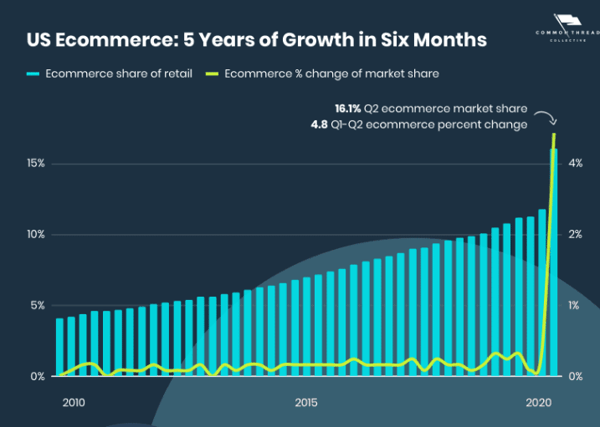
Maybe the rate of change will slow down. Maybe some of it will reverse as well as digital-weary customers return to the simple joys of in-person shopping.
But the trend is unmistakable: the future is digital and if your clients are to survive, they have to embrace it.
This shift means two things for you as an agency:
- You have to rethink your business model, target clients, and service offerings
- You have to reskill your employees to meet the demands of your new model
While we’ll get to employee skill gaps later, let’s talk about your future business model for now.
The pandemic has ushered in two major changes in how agencies operate:
- Location: In the digital-first, remote-friendly world, agency location matters a lot less for winning deals. You will likely not need a local office to win local clients in the future. This also affects your ability to attract talent - you’re no longer limited to the local talent pool.
- Services: As your clients prioritize digital, your service offerings need to change as well. A brick and mortar store that might have spent 30-40% on local print/radio/TV ads will now allocate that budget to digital.
To keep pace with these changes, you’ll likely have to change your business model as well. For instance, if you were doing a lot of TV/radio ads for local businesses, you were likely taking a percentage of the media spend. But if these budgets move to, say, SEO, you’ll have to charge hourly rates.
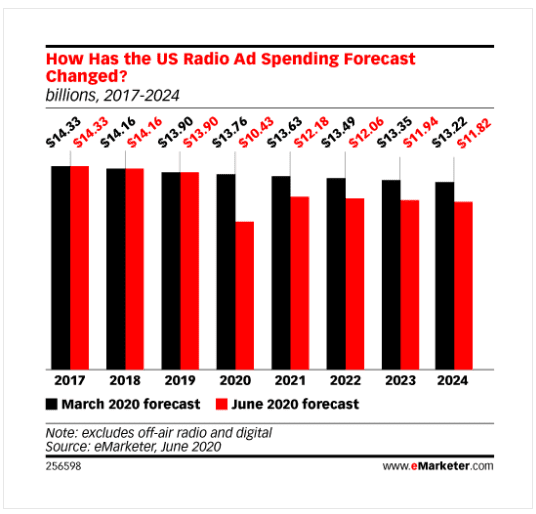
The shift in ad budgets can be seen in the sharp decline in radio advertising (down by 25%) (Image source: eMarketer)
That’s just the tip of the iceberg. If your agency becomes truly location independent, your clients can theoretically be from anywhere in the world. You might have been charging ‘New York rates’ if you were based out of Madison Avenue. But with a truly global client base, can you keep on doing the same?
This is why in the post-pandemic world, your old skillsets won’t do. Your account managers might have been brilliant at closing deals in-person, but can they do the same via a video call? You might have built your expertise in producing TV ads, but does that skill translate to YouTube and TikTok videos?
Before you decide on an employee education strategy, you need to zero-in on your future business model.
How much of your business is poised to change by 2021? How much of it will remain the same? What skills do you need to bridge the gap?
Speaking of gaps…
Identify and Bridge Crucial Skill Gaps
What does “skill” really mean in the context of an agency?
Most people would define it in terms of technical capabilities - Photoshop, ReactJS, Python, After Effects, etc.
But in the post-pandemic world, these aren’t the only skills your employees need to thrive. They have to master an entirely new set of skills: working remotely.
Business leaders across industries expect anywhere from 5 to 50% of their workforce to be remote post-COVID.
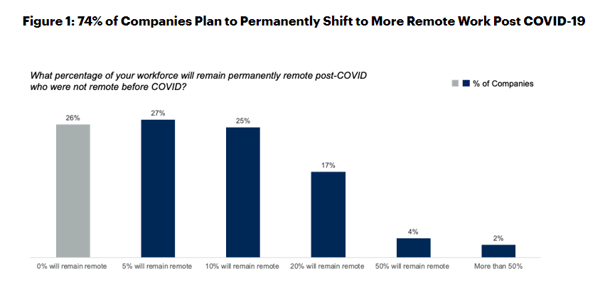
For agencies, the number is likely to be higher (one survey puts it as high as 42%) since agency employees can work from anywhere.
However, there’s a key problem: agency employees don’t have the skills to be successful remote workers.
Sure, you might have hastily patched together a training program for remote work during the lockdown. Some of you might have even experienced productivity gains as employees embrace their new-found work-from-home freedom.
But ask yourself: is this approach truly sustainable? Can your hotchpotch remote work program truly be a lasting solution? What do you plan to do when remote work fatigue, loneliness, and collaboration issues crop up?
Even before the pandemic, most surveys pointed out that remote workers struggle to collaborate effectively.
Buffer’s annual State of Remote Work survey - which mostly focuses on startup employees (a cohort that has some overlap with agency workers) - found that collaboration, unplugging after work, and loneliness are three key issues for remote workers.
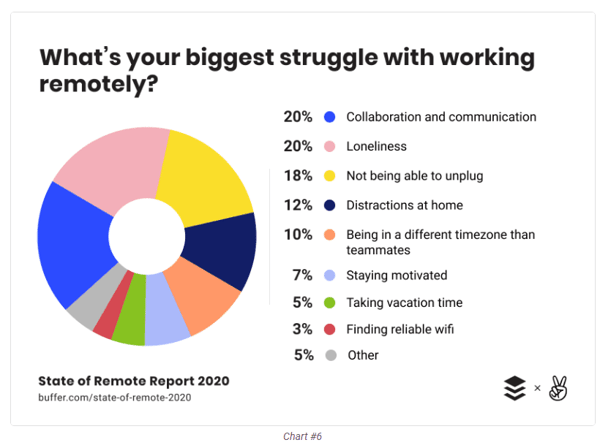
If you want to transition to a fully or partially remote agency, it’s imperative that you address these issues as well.
Chiefly, your post-pandemic employee education must focus on three key skill areas:
- Technical skills: Picking up new skills in line with your business model should be a top priority. Analyze the new business model you mapped earlier. Then analyze the skills you currently have and the skills you need to acquire. This forms the core of your “skill gap”.
- Remote working: Being an effective remote worker is not an innate skill. Rather, it can be learned. There is a technical component to it, such as mastering remote working/collaboration tools. More importantly, your education should focus on helping employees manage themselves better. This includes a stronger focus on communication, time management, and processes.
- Mental health: You can’t afford to ignore mental health when dealing with remote workers. Loneliness is a very real issue and it will drag your employee morale down. Helping employees develop stronger interpersonal relationships, investing in empathy training, and even wellness-focused classes such as guided meditation can help overcome the fatigue and isolation of remote work.
Essentially, you have to embrace a more holistic definition of “skills”. Being technically proficient is not enough; you also have to ensure that your employees have the know-how to thrive in a remote office.
Create Custom Learning Paths
If you were holding an in-person weekend workshop for your designers, every designer would have to participate in it, regardless of their current skill level.
With online learning, it’s entirely possible to create entirely different learning paths for every one of your employees. An employee who is proficient at Photoshop but lags behind on Illustrator, doesn’t have to sit through a Photoshop workshop. She can just opt for an Illustrator course from a broad catalog.
These customized learning paths should ideally focus on the skill gaps you identified above. Offer employees a selection of mandatory and optional courses. The former should include skills you absolutely need employees to pick up.
For the latter, offer employees an annual budget and the freedom to learn whatever they want.
It’s a good idea to get access to a large learning library like Lynda, Coursera, Udacity, etc. Some of these offer certification programs as well.
If you’re looking for project management courses, refer to our list here.
It is imperative that you start the reskilling process as soon as possible. As McKinsey’s research shows, companies that started reskilling earlier feel more confident about meeting future challenges.
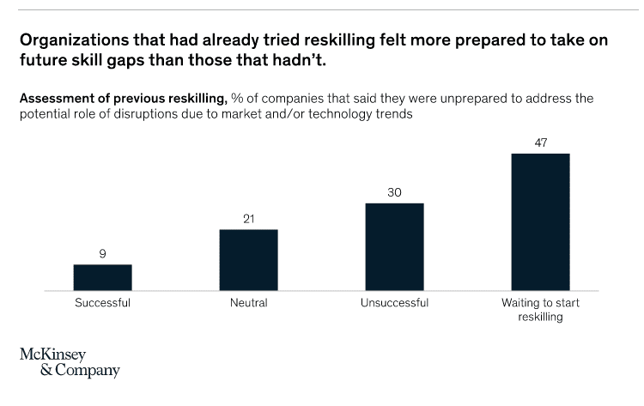
Make sure to tap into the wisdom of your employees as well. If someone on your team has extensive remote work experience, ask them to share it with others.
While you’re at it, also make sure to create learning paths for your managers. A lot of them are entirely new to remote work and struggle to apply their existing knowledge to it. Equip them with the skills, fortitude, and confidence to manage these new challenges and they will thrive.
Lastly, remember that we’re all new to this ‘new normal’. We really don’t know how remote work will play out in the long-term, or what kind of agency business models will crop up in the future. Don’t be afraid to abandon an education strategy that doesn’t seem to show any results.
It’s a brave new world; employee education is one way to prepare for it.
Over to You
In a changing world, your employee education strategy can’t remain the same. By mapping your business needs, identifying skill gaps, and creating custom learning paths, you can help your employees train for the challenges ahead.
Another way to help employees thrive in the post-pandemic world is to give them better technical tools. Switch from email and spreadsheets to Workamajig to make everything from collaboration to project management easier.
Click the link below for a free demo and see how Workamajig can transform your agency.
